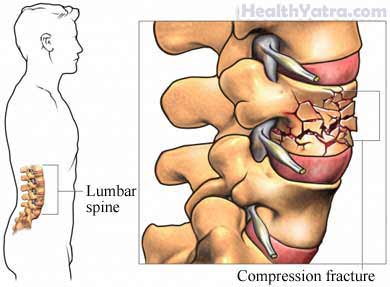Definition
The bones of the back are called the vertebrae. A vertebral fracture is a break in one of these bones. A vertebral compression fracture occurs when the front part of the bone is squeezed or compressed.

Causes
A vertebral compression fracture can be caused by:
- Osteoporosis—a condition of weakened bones
- A blow to the back
- Falling down
- Landing on your heels when jumping from a height
- Having major trauma (for example, from a motor vehicle accident)
Risk Factors
Other than trauma, osteoporosis is the main cause of most vertebral compression fractures.
Factors that increase the risk of osteoporosis include:
- Race: Caucasian or Asian
- Sex: female
- Advancing age:
- Females: 60 and older
- Males: 70 and older
- Postmenopausal
- Stroke
- Hyperthyroidism
- Use of certain medicines:
- Long-acting benzodiazepines
- Tricyclic antidepressants
- Anticonvulsants
- Long-term steroid use
- Limited physical activity
- Housebound
- Poor nutrition
- Smoking
- Mother or maternal grandmother with hip fracture (a genetic disposition)
- Other factors that may increase the risk of vertebral fractures include the following:
- Use of antipsychotic medicines
- Poor mental functioning
- Poor mobility
- Poor strength
- Previous vertebral fracture within the last year
Symptoms
Symptoms may include mild-to-severe pain in the middle or lower back.
Diagnosis
Your doctor will ask about your symptoms and medical history. A physical exam will be done.
Test may include:
- X-rays of the spine—to look for a fracture
- MRI scan—a test that uses magnetic waves to make pictures of structures inside the body
- CT scan—a type of x-ray that uses a computer to make pictures of structures inside the body
- Bone scan—a test that detects areas of increased or decreased bone activity
- Bone mineral density test—to help determine if you have osteoporosis, and if so, how severe it is
Treatment
Treatment includes:
Surgery
Vertebroplasty involves liquid cement being injected into the vertebra. It can help relieve the pain associated with vertebral fractures. It is not suitable for everyone. The procedure may be best for recent fractures. Talk with your doctor to see if this option may be right for you. For example, it may not be as helpful in people whose fractures are due to osteoporosis.
In kyphoplasty, a balloon is used to create a cavity. The cement is injected into the cavity. This procedure is designed to relieve pain. It can also improve spinal deformities from the fractures.
Nonsurgical Treatments
Your doctor may prescribe:
- Brief period of bed rest and a decrease in activity
- Medicine to control the pain
- Strengthening exercises for your back muscles
- Back brace
Treatment for Osteoporosis
Medications
To prevent further bone loss, medicines may include:
- Estrogen/progesterin hormone replacement therapy
- Bisphosphonates (alendronate, risedronate, ibandronate)
- Estrogen agonist/antagonist (raloxifene)
- Calcitonin (Miacalcin, Fortical)
- Parathyroid hormone
Your doctor may also recommend the following to maintain your bones:
- Vitamin and mineral supplements, especially calcium and vitamin D—Studies indicate that the combination of calcium and vitamin D appears to help bone loss.
- Lifestyle changes—These may include weight-bearing and resistance exercises for both the upper and lower extremities.
Prevention
Building strong bones will help prevent fractures. However, most bone strength is attained by women before they are 25 years old. That makes maintaining bone density and strength at older ages even more important.
- Get plenty of weight-bearing exercise. This includes walking, jogging, or sports such as tennis.
- Do resistance exercises for arms and legs. This will help to improve your strength and balance.
- Get plenty of calcium, vitamin D, and protein in your diet. Talk to your doctor if you think you need supplements.
- If you have osteoporosis, you should talk to your doctor about treatment options. If you had an early menopause, talk to your doctor about this.
- Stop smoking. Drink alcohol only in moderation. Moderate alcohol intake is two drinks per day for men and one drink per day for women.
- Eliminate any obstacles in your home that could cause you to fall. These may include throw rugs or furniture.
